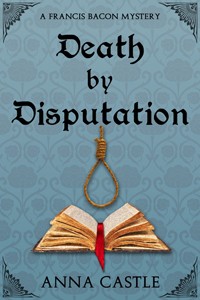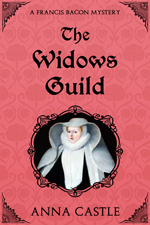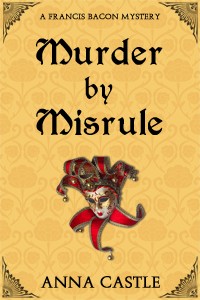Today, I’m delighted to welcome Anna Castle to Virtual Book Club, an interview series in which I put questions to authors about the books they would like your book clubs to read. If you’d like to pose a question, you’ll have the opportunity to do so at the end. (And there’s also a giveaway to look forward to.)
Anna writes the Francis Bacon mysteries and the Lost Hat, Texas mysteries. She’s earned a series of degrees — BA Classics, MS Computer Science, and PhD Linguistics — and has had a corresponding series of careers — waitressing, software engineering, assistant professor, and archivist. Writing fiction combines her lifelong love of stories and learning.
Q: Anna, we’re going to talk today about the Francis Bacon mysteries. But first of all, I know that your love of stories started as a reader. Can you remember the first book you were able to read on your own?
My parents say that I started reading on my own around age four. I’m pretty sure those would have been Dr. Seuss books. My father started taking us to the library every other Saturday when I was about six. The librarian in the children’s room taught me to use the card catalogue so I could read all the books about dragons. That did it; I was hooked. So, the dragons did it.
Q: What would tempt you to read outside your comfort zone?
My desire to write better. The best way to improve one’s prose style and sense of story is to read widely, through time and genre.
Q: To what extent do you think self-publishing gives readers greater freedom when it comes to choosing what to read?
Self-publishing has liberated literature from the marketplace. I’ve read the most imaginative, creative, surprising things since I went on a strictly indie diet a couple of years ago. As I’m reading, I can understand why the books didn’t sell to traditional publishers (if the author tried to do so.) The book is too long or too short, or the protagonist is too old or the wrong sex, or the period of history isn’t popular enough, or it’s too popular. Traditional publishing has built itself a pretty narrow box.
I think my own Francis Bacon books are a good example of this. They’re fundamentally light-hearted and optimistic, like Bacon himself, but the standard view of the Tudor century seems to demand a darkly cynical atmosphere. My books have important romantic subplots, but the protagonists are male. For all their sins, the Elizabethans knew how to have fun. I wanted to read stories with that quality, which meant I had to write them myself.

Click here to look inside or buy
(B.R.A.G.Medallion Honoree)
Q. You write historical mysteries. How faithfully do your novels stick to the written record?
Historical accuracy is the whole point of the exercise; otherwise, why call it historical fiction? The purpose is to immerse yourself and your readers in another period. I try not to make up anything but the story and most of the characters. I’m persnicketty about details of material culture and maps and other physical things, but more essential to me is the worldview, the attitudes and beliefs of the characters. If I believe those when I’m reading, I can forgive the odd button or misplaced table utensil.
Q: Of course, you incorporate real life characters in your novels.
I do, yes. Francis Bacon’s life and letters provide the primary context and research source for my stories, so his relations and acquaintances necessarily appear in greater or lesser roles. I’d be crazy not to use real people like Lady Bacon (his mother) and Lady Russell (his aunt); they’re absolutely wonderful characters.
Then I like to find lesser sorts when possible, like Elizabeth Moulthorne, a Flemish surgeon who worked in London during my period, and Thomas Skinner, one of the two sheriffs of London in 1588. It just makes it feel more real to me, to know that there’s a whole city full of people, going about their business, who might or might not step into my story.
Q: Do you feel under pressure to make your main characters likable?
I have to like them, including my bad guys, who must have some sympathetic kernel. Protagonists have to be likable or people won’t stick with them. I won’t, and that includes my characters as well as those in other books. Why should I spend quality time with a person I don’t like?
But they certainly don’t need to be paragons of virtue. It’s far more important for me that they be true to their times than that they be good people by contemporary standards. Vanity is not a flaw in the Elizabethan period, at least not in the sense of being careful of one’s appearance. Gifts to important people are not necessarily bribes and besides, sometimes bribery is the only way to get things done. You should be wary, at the least, of foreigners and people of other religious beliefs. And of course you should hire your own relations! Why wouldn’t you?
Q: How do you create and construct distinctly individual supporting characters?
I tend to create characters in groups or pairs, designing them to contrast and balance one another. For example, Francis Bacon was a genius, a man of supreme rationality. But by his own admission, he was shy, at least when young, and socially awkward. He was not the slightest bit athletic and hated traveling. So I gave him an assistant, Thomas Clarady, who is vigorous and adventurous, and has social intelligence and street smarts.
Tom has three friends. I used the theory of humours to help me clarify their individual natures. Tom is sanguine, obviously, being courageous and playful. Trumpet is choleric: ambitious, high-tempered, and a natural leader. Stephen is phlegmatic: passive, slowish, a follower. Ben is melancholic, like Bacon: intellectual, analytical, and studious.
Q: Have you ever become so attached to your characters that you haven’t wanted to let go of them?
I write three series (one yet to be published) and I always miss the characters in whichever series isn’t currently on the desk. Whenever I get frustrated with my work in progress, the other people start popping into my head with ideas for stories far better than the one under my fingers. It’s like having dinner parties going on in three different rooms of a very large house. I can hear the laughter and merriment echoing from the other rooms, but I can only eat one meal at a time.

Click here to look inside or buy
Q: Why mysteries?
I like a solid architecture. If I were a poet, I’d write sonnets. In a mystery, we start with someone finding a body. Then our sleuth must accept the case. Then he, she, or they investigate, formulating theories of the crime, testing and discarding them, until they reach the truth. Then we have the moment of confrontation and then we are done. I love it, both the challenge of staying inside the frame and of making each story different within that constraint.
Q: There’s a rather glib saying: ‘All fiction is biography and all biography is fiction’. Do you agree?
Not at all. This is the sort of thing that people with little imagination say, because they are unable to understand how you can make things up that are outside your own experience.
Unless the saying means, “First you make up some characters and then you write biographies of them,” in which case, I wholeheartedly agree.
Q: Who designed your book cover/s? If you used a cover designer, what brief did you give them? (Please feel free to give them a plug)
My covers are designed by Jennifer Quinlan at Historical Editorial. She also does the editing. I wanted a series look, something simple but with a touch of the individual book. We looked at several other series styles and came up with this design together. I love them.
Q: What do you want readers to think or feel after reading one of your books?
Like they’ve had a marvelous vacation in a faraway time and place. They should blink a few times and think, “Where am I and why are the people here so strangely garbed?”
A Giveaway? Yes, please!
Anna is giving away an ebook copy of Murder by Misrule, Book 1 in the series, rated PG with a biggish vocabulary, ‘open to anyone with an email address’ (reply in the comments or by using the contact tab).

Click here to Look Inside or buy
(B.R.A.G. Medallion Honoree)
“Francis Bacon must catch a murderer to regain Queen Elizabeth’s favour. He recruits handsome Thomas Clarady to chase witnesses from Whitehall to the London streets. Everyone has something up his pinked and padded sleeve. Even the brilliant Bacon is at a loss — and in danger — until he sees through the disguises of the season of Misrule.”
Want to find out more?
Visit Anna’s website or find her on Facebook.
Remember, if you enjoyed this post please share it. If there’s anything else you’d like to ask Anna, leave a comment.
To have future posts delivered directly to your in-box, visit the sidebar on the right and subscribe to my blog, or to find out about new releases, competitions and freebies, subscribe to my newsletter and grab your free copy of my novel, I Stopped Time.
And if you’re an author and would like to appear on Virtual Book Club, please fill in a contact form.



3 comments
Thanks for having me, Jane! The interview was a lot of fun. Many intriguing questions to choose from…
Sounds like a great series. I’d love to enter the giveaway please. My email address is margarita@margaritamorris.com . Thanks.
Hello, lovely interview. I am interested in the giveaway
serenasland@hotmail.com